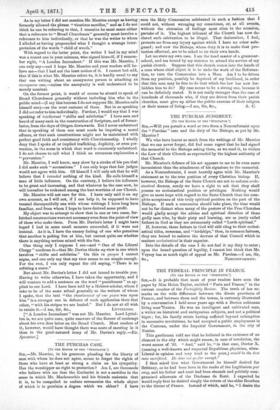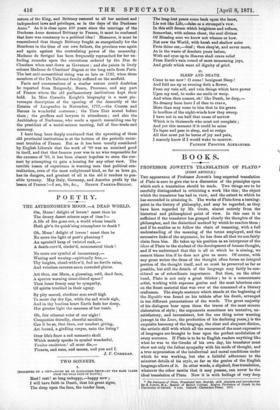THE FEDERAL PRINCIPLE IN FRANCE.
[TO THE EDITOR OF THE "SPECTATOR."] SIR,—It is probable that most of your readers have seen the paper by Miss Helen Taylor, entitled " Paris and France," in the current number of the Fortnightly Review. The truth of her re- marks on the wide difference between the divers provinces of France, and between them and the towns, is curiously illustrated by a conversation I held some years ago with a Breton nobleman living neat...Nantes. He was an intelligent and cultivated man, a writer on historical and antiquarian subjects, and not a political bigot ; for, his family estate having suffered beyond redemption in successive revolutions, he had accepted a public employment in the Customs, under the Imperial Government, in the city of Nantes.
This gentleman told me that he believed in the existence of an element in the city which might renew, in case of revolution, the worst scenes of '93. "And," said he, "in that case, Doctor X. (naming a well-known and respected Republican physician, ultra- Liberal in opinion and very kind to the poor,) would be the first man sacrificed. He does not go far enough."
I then asked him what Government he himself desired for Brittany, as he had been born in the ranks of the Legitimists pur sang, and his father and aunt had been staunch and publicly com- promised adherents of the Duchesse de Berri. I expected he would reply that he desired simply the return of the elder Bourbon to the throne of France. Instead of which, said he, " I desire the
return of the King, and Brittany restored to all her ancient and independent laws and privileges, as in the days of the Duchease Anne." As it is close upon 400 years since the marriage of the Duchesse Anne ttnnexed Brittany to France, it must be confessed that here was constancy to a political idea ! Moreover, it must be remembered that though Brittany fought so energetically for the Bourbons in the time of our own fathers, the province rose again and again against the centralizing power of the monarchy. Madame de Sevigne has been frequently reproached for her un- feeling remarks upon the executions ordered by the Duo de Chaulnes when sent down as Governor ; and she paints in lively colours Madame de Chaulnes' disgust at the long exile from Paris. The last anti-monarchical rising was so late as 1720, when three members of the De Talhouet family suffered on the scaffold.
Facts and conversations of a similar nature could doubtless be reported from Burgundy, Bearn, Provence, and any part of France where the old parliamentary institutions kept their hold. In Miss Cornelia Knight's biography is a most pic- turesque description of the opening of the Assembly of the Estates of Languedoc in November, 1777,—the Counts and Barons in wonderful costumes ; the Tiers Etat seated before them ; the greffiers and lawyers in attendance ; and also the Archbishop of Narbonne, who made a speech resembling one by the president of a social-science meeting, full of free-trade and economy.
I have long been deeply convinced that the uprooting of these old provincial institutions is at the bottom of the periodic recur- rent troubles of France. But as it has been usually considered by English Liberals that the work of '89 was an unmixed good in itself, and that that famous year was in no wise responsible for the excesses of '93, it has been almost hopeless to stem the cur- rent by attempting to gain a hearing for any other view. The terrible lesson of experience is warning men that political cen- tralization, even of the most enlightened kind, so far as laws go, has its dangers, and greatest of all is the aid it renders to pos- sible tyranny. May Italy, Germany, and America profit by the lesson of France !—I am, Sir, &e., BESSIE PARKES-BELLOC.



































 Previous page
Previous page